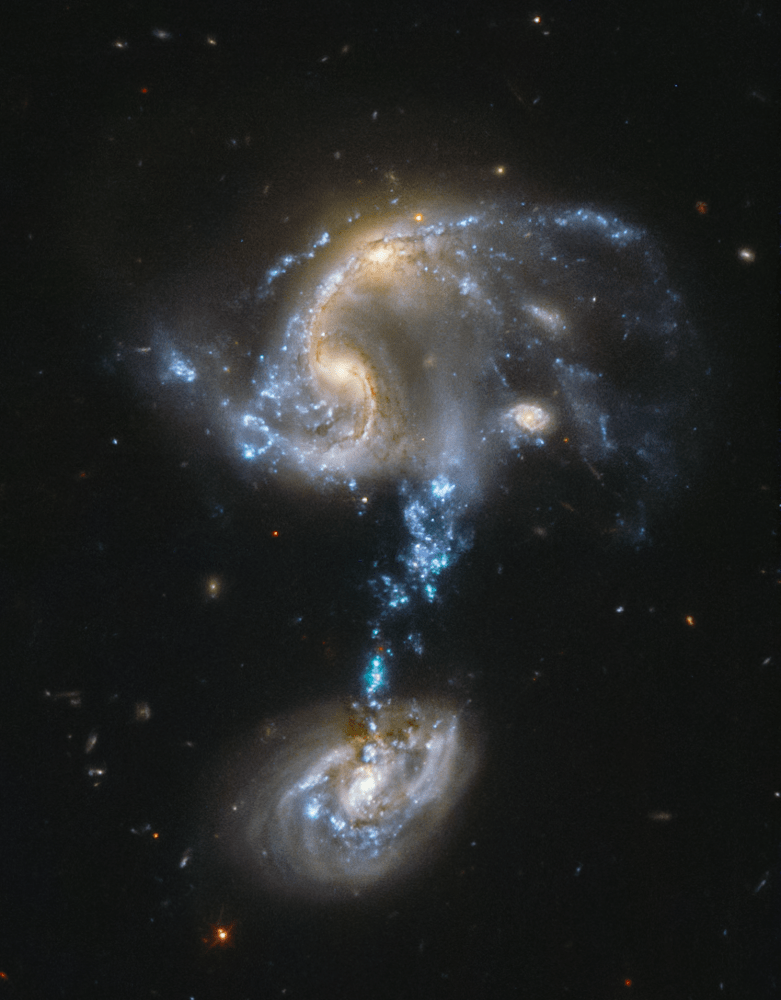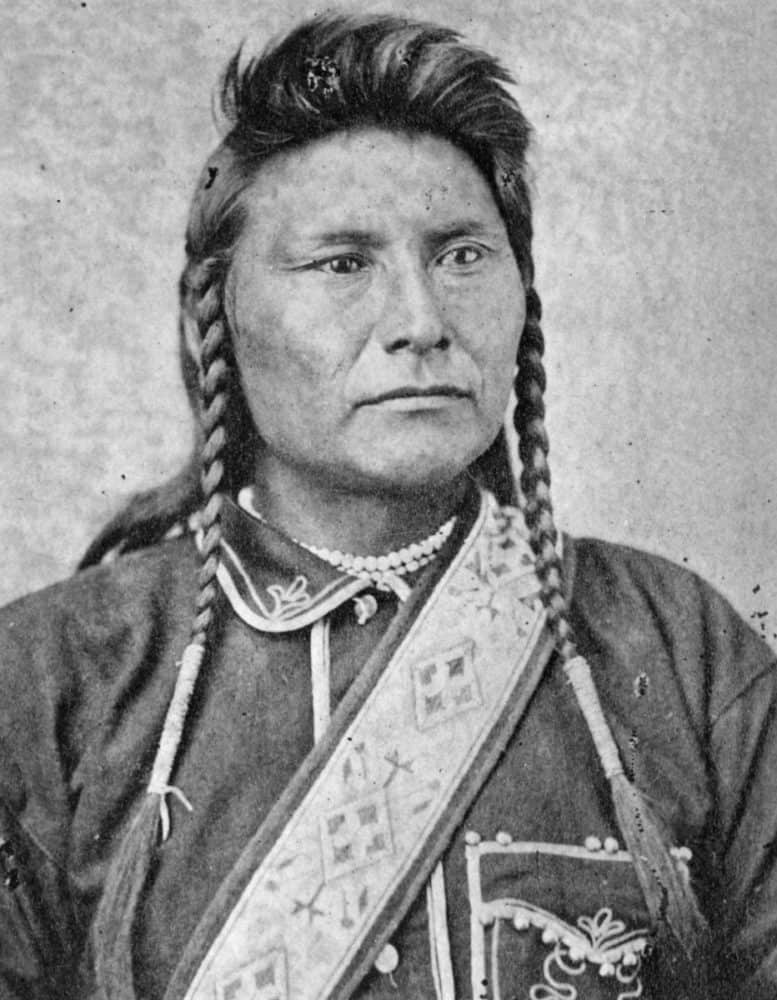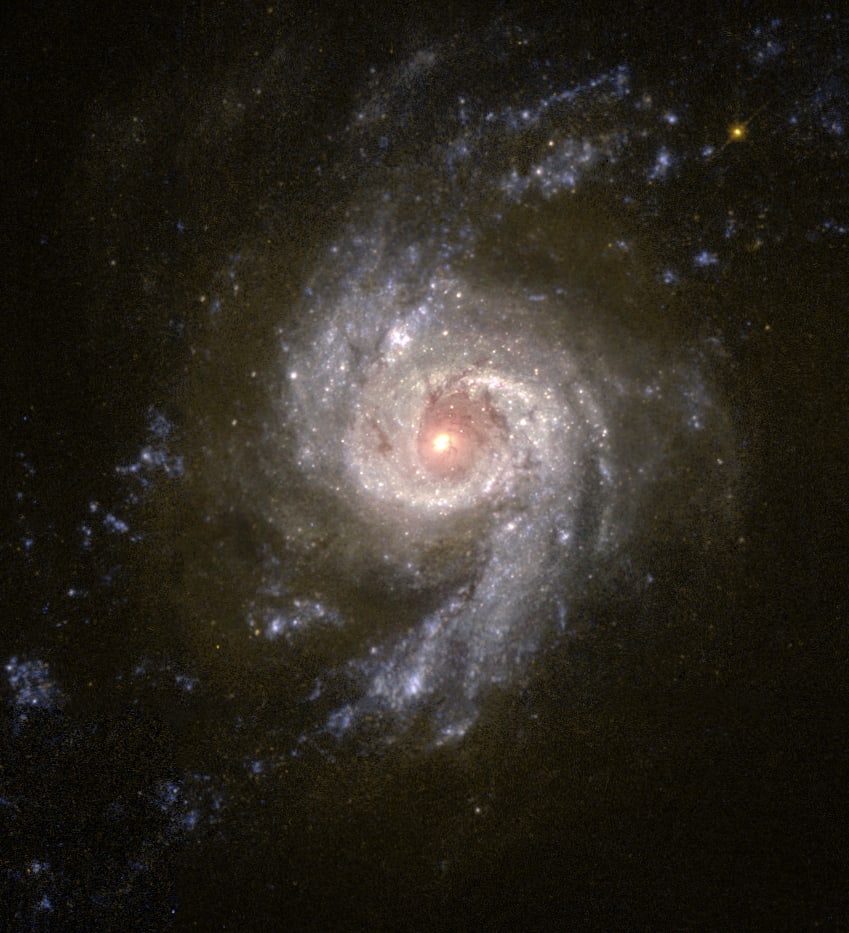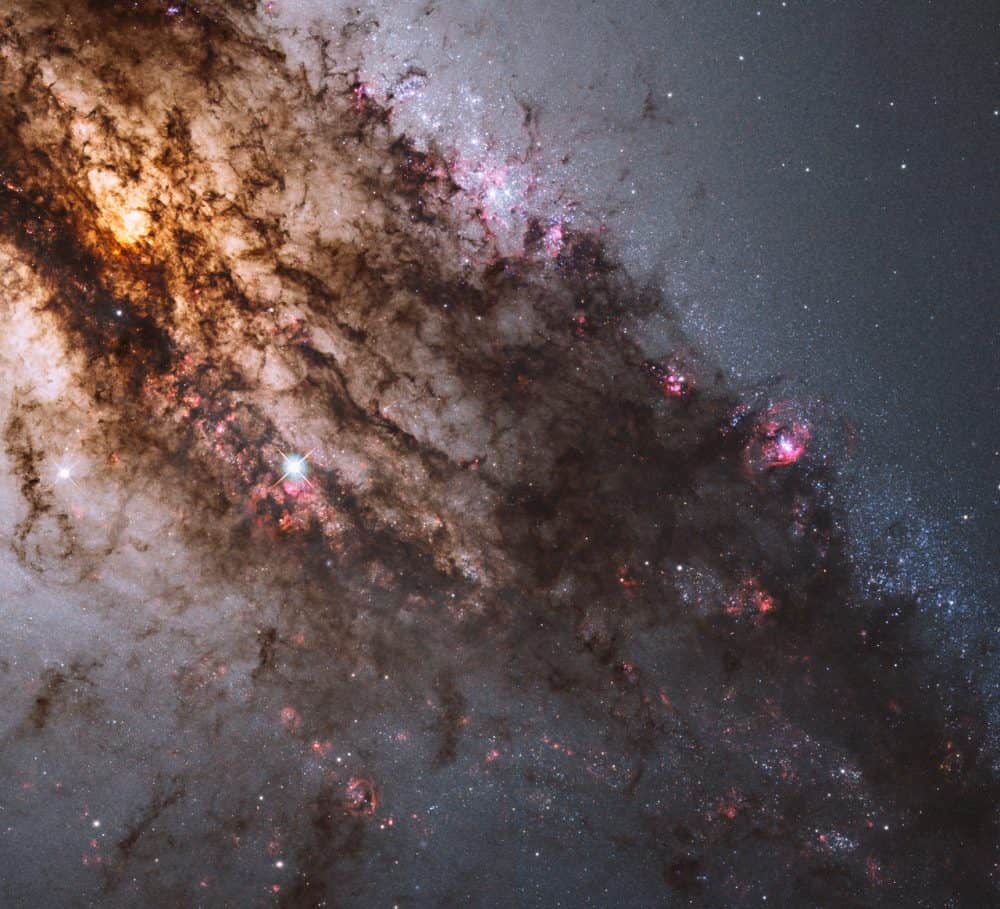Blog
UGC 6945 (also known as Arp 194) is a trio of interacting galaxies. The highly disrupted galaxy to the northwest is actually two galaxies in the advanced stages of merger, and has an angular size of 0′.8 × 0′.6. About 40″ to the southeast is a third galaxy with an angular size of 0′.35 × 0′.35.
Based upon a radial velocity of about 10,500 km s−1, the interacting pair of galaxies at the northwest are located at a distance of 175 Mpc (570 Mly) from us (assuming a Hubble constantvalue of 60 km s−1 Mpc−1). If we further assume that the third galaxy lies at the same distance away from us, we find that the galaxies are separated by a projected linear distance of roughly 34 Kpc (110 Kly), though later findings from Hubble may cast this assumption into doubt (see below)
As the pair of galaxies in the north gravitationally interact with each other, tidally-stripped gas from both galaxies is draped over the southern galaxy as a series of blobs, which are fueling a burst of star formation. While it has long been believed to be interacting with the northern galaxy, images from the Hubble Space Telescope clearly show that this stream of material is actually superimposed on the southern galaxy. This suggests that this third galaxy may actually lie in the background. Due to this uncertainty, the third galaxy may not be involved in the interaction.
more...Allen Toussaint (/ˈtuːsɑːnt/; January 14, 1938 – November 10, 2015) was an American musician, songwriter, arranger and record producer, who was an influential figure in New Orleans R&Bfrom the 1950s to the end of the century, described as “one of popular music’s great backroom figures.” Many musicians recorded Toussaint’s compositions, including “Java“, “Mother-in-Law“, “I Like It Like That“, “Fortune Teller“, “Ride Your Pony“, “Get Out of My Life Woman“, “Working in the Coal Mine“, “Everything I Do Gonna Be Funky”, “Here Come the Girls“, “Yes We Can Can“, “Play Something Sweet“, and “Southern Nights“. He was a producer for hundreds of recordings, among the best known of which are “Right Place, Wrong Time”, by his longtime friend Dr. John (“Mac” Rebennack), and “Lady Marmalade“, by Labelle.
The youngest of three children, Toussaint was born in 1938 in New Orleans and grew up in a shotgun house in the Gert Town neighborhood, where his mother, Naomi Neville (whose name he later adopted pseudonymously for some of his works), welcomed and fed all manner of musicians as they practiced and recorded with her son. His father, Clarence, worked on the railway and played trumpet. Allen Toussaint learned piano as a child and took informal music lessons from an elderly neighbor, Ernest Pinn. In his teens he played in a band, the Flamingos, with the guitarist Snooks Eaglin, before dropping out of school. A significant early influence on Toussaint was the syncopated “second-line” piano style of Professor Longhair.
After a lucky break at age 17, in which he stood in for Huey “Piano” Smith at a performance with Earl King‘s band in Prichard, Alabama, Toussaint was introduced to a group of local musicians led by Dave Bartholomew, who performed regularly at the Dew Drop Inn, a nightclub on Lasalle Street in Uptown New Orleans. His first recording was in 1957 as a stand-in for Fats Domino on Domino’s record “I Want You to Know“, on which Toussaint played piano and Domino overdubbed his vocals. His first success as a producer also came in 1957 with Lee Allen’s “Walking with Mr. Lee”. He began performing regularly in Bartholomew’s band, and he recorded with Fats Domino, Smiley Lewis, Lee Allen and other leading New Orleans performers.
more...Kenneth Vincent John Wheeler, OC (14 January 1930 – 18 September 2014) was a Canadian composer and trumpet and flugelhorn player, based in the U.K. from the 1950s onwards.
Most of his performances were rooted in jazz, but he was also active in free improvisation and occasionally contributed to rock music recordings. Wheeler wrote over one hundred compositions and was a skilled arranger for small groups and large ensembles.
Wheeler was the patron of the Royal Academy Junior Jazz course.
Wheeler was born in Toronto, Ontario, on 14 January 1930. Growing up in Toronto, he began playing cornet at age 12, and became interested in jazz in his mid-teens. Wheeler spent a year studying composition at The Royal Conservatory of Music in 1950. In 1952 he moved to Britain. He found his way into the London jazz scene of the time, playing in groups led by Tommy Whittle, Tubby Hayes, and Ronnie Scott.
more...Grady Bernard Tate (January 14, 1932 – October 8, 2017) was an American jazz and soul-jazz drummer and baritone vocalist. In addition to his work as sideman, Tate released many albums as leader lent his voice to songs in the animated Schoolhouse Rock! series.
Tate was born in Hayti, Durham, North Carolina. In 1963 he moved to New York City, where he became the drummer in Quincy Jones‘s band.
Grady Tate’s drumming helped to define a particular hard bop, soul jazz and organ trio sound during the mid-1960s and beyond. His slick, layered and intense sound is instantly recognizable for its understated style in which he integrates his trademark subtle nuances with sharp, crisp “on top of the beat” timing (in comparison to playing slightly before, or slightly after the beat). The Grady Tate sound can be heard prominently on many of the classic Jimmy Smith and Wes Montgomery albums recorded on the Verve label in the 1960s.
During the 1970s he was a member of the New York Jazz Quartet. In 1981 he played drums and percussion for Simon and Garfunkel’s Concert in Central Park.
As a sideman he has played with musicians including Jimmy Smith, Astrud Gilberto, Ella Fitzgerald, Duke Ellington, Count Basie, Rahsaan Roland Kirk, Quincy Jones, Stan Getz, Wes Montgomery, and Michel Legrand.
more...The year 1994 saw the founding of the group Alboka by three well-known Spanish Basque musicians and one Irishman. Aside from their personal musical projects, these four different personalities, Txomin Artola (guitar), Josean Martin Zarko (mandolin, bouzouki), Joxan Goikoetxea (accordion, synths) and Alan Griffin (alboka, bagpipes, flute), decided to set up a group that would compile and perform acoustic instrumental traditional music.
more...https://www.youtube.com/watch?v=TwiNW54bhRc
more...“Let me be a free man, free to travel, free to stop, free to work, free to trade where I choose, free to choose my own teachers, free to follow the religion of my fathers, free to talk, think and act for myself — and I will obey every law or submit to the penalty.” Chief Joseph of the Nez Perce.
more...NGC 3310 is a grand design spiral galaxy in the constellation Ursa Major. It is a starburst galaxy and it is likely that NGC 3310 collided with one of its satellite galaxies about 100 million years ago, triggering widespread star formation. It is thought to be located approximately 46 million light-years away from the Earth, and is thought to be about 22,000 light-years wide.
The ring clusters of NGC 3310 have been undergoing starburst activity for at least the last 40 million years.
more...Joe Pass (born Joseph Anthony Jacobi Passalaqua; January 13, 1929 – May 23, 1994) was an American jazz guitarist of Sicilian descent. He is considered one of the greatest jazz guitarists of the 20th century. He created possibilities for jazz guitar through his style of chord-melody, his knowledge of chord inversions and progressions, and his use of walking basslines and counterpoint during improvisation. Pass worked often with pianist Oscar Peterson and vocalist Ella Fitzgerald.
Born in New Brunswick, New Jersey, Joe Pass was the son of Mariano Passalaqua, a Sicilian-born steel mill worker. He was raised in Johnstown, Pennsylvania. He received his first guitar, a Harmony, on his ninth birthday. His father recognized early that his son had “a little something happening” and pushed him to learn tunes by ear, practice scales, play pieces written for other instruments, and to fill in the space between the notes of the melody.
As early as 14, Pass started getting jobs performing. He played with bands led by Tony Pastor and Charlie Barnet, honing his guitar skills while learning about the music business. He began traveling with small jazz groups and moved from Pennsylvania to New York City. In a few years, he developed a heroin addiction and spent much of the 1950s in prison. He emerged from addiction through a two-and-a-half-year stay in the Synanon rehabilitation program. During that time he “didn’t do a lot of playing”. In 1962 he recorded Sounds of Synanon. Around this time he received his trademark Gibson ES-175 guitar as a gift, which he used on tours and records for many years.
more...Daniel Moses Barker (January 13, 1909 – March 13, 1994) was an American jazz musician, vocalist, and author from New Orleans. He was a rhythm guitarist for various bands of the day, including Cab Calloway, Lucky Millinder and Benny Carter throughout the 1930s.
One of Barker’s earliest teachers in New Orleans was fellow banjoist Emanuel Sayles, with whom he recorded. Throughout his career, he played with Jelly Roll Morton, Baby Dodds, James P. Johnson, Sidney Bechet, Mezz Mezzrow, and Red Allen. He also toured and recorded with his wife, singer Blue Lu Barker. From the 1960s, Barker’s work with the Fairview Baptist Church Brass Band was pivotal in ensuring the longevity of jazz in New Orleans, producing generations of new talent, including Wynton and Branford Marsalis who played in the band as youths.
Danny Barker was born to a family of musicians in New Orleans in 1909, the grandson of bandleader Isidore Barbarin and nephew of drummers Paul Barbarin and Louis Barbarin. He took up clarinet and drums before switching to a ukulele that his aunt got him, and then a banjo from his uncle or a trumpeter named Lee Collins.
Barker began his career as a musician in his youth with his streetband the Boozan Kings, and also toured Mississippi with Little Brother Montgomery. In 1930 he moved to New York City and switched to the guitar. On the day of his arrival in New York, his uncle Paul took him to the Rhythm Club, where he saw an inspiring performance by McKinney’s Cotton Pickers. It was their first performance in New York as a band.
Barker played with several acts when he moved to New York, including Fess Williams, Billy Fowler and the White Brothers. He worked with Buddy Harris in 1933, Albert Nicholas in 1935, Lucky Millinder from 1937 to 1938, and Benny Carter in 1938. During his time in New York, he frequently played with West Indian musicians, who often mistook him for one of them due to his Creole style of playing.
more...a Belgian with Turkish roots and an Armenian
more...Resembling looming rain clouds on a stormy day, dark lanes of dust crisscross the giant elliptical galaxy Centaurus A.
Hubble’s panchromatic vision, stretching from ultraviolet through near-infrared wavelengths, reveals the vibrant glow of young, blue star clusters and a glimpse into regions normally obscured by the dust.
The warped shape of Centaurus A’s disk of gas and dust is evidence for a past collision and merger with another galaxy. The resulting shockwaves cause hydrogen gas clouds to compress, triggering a firestorm of new star formation. These are visible in the red patches in this Hubble close-up.
At a distance of just over 11 million light-years, Centaurus A contains the closest active galactic nucleus to Earth. The center is home for a supermassive black hole that ejects jets of high-speed gas into space, but neither the supermassive black hole or the jets are visible in this image.
This image was taken in July 2010 with Hubble’s Wide Field Camera 3.
more...George M. Duke (January 12, 1946 – August 5, 2013) was an American keyboard pioneer, composer, singer-songwriter and record producer. He worked with numerous artists as arranger, music director, writer and co-writer, record producer and as a professor of music. He first made a name for himself with the album The Jean-Luc Ponty Experience with the George Duke Trio. He was known primarily for thirty-odd solo albums, of which A Brazilian Love Affair from 1980 was his most popular, as well as for his collaborations with other musicians, particularly Frank Zappa.
George Duke was born in San Rafael, California and raised in Marin City. At four years old he became interested in the piano. His mother took him to see Duke Ellington in concert and told him about this experience. “I don’t remember it too well, but my mother told me I went crazy. I ran around saying ‘Get me a piano, get me a piano!'” He began his formal piano studies at the age of 7 at a local Baptist church.
In 1975, Duke fused jazz with pop, funk, and soul music on his album From Me to You. Three years later his album Reach for It entered the pop charts, and his audiences increased. During the 1980s his career moved to a second phase as he spent much of his time as a record producer. He produced pop and R&B hits for A Taste of Honey, Jeffrey Osborne, and Deniece Williams. His clients included Anita Baker, Rachelle Ferrell, Everette Harp, Gladys Knight, Melissa Manchester, Barry Manilow, The Pointer Sisters, Smokey Robinson, and Take 6.
more...James Columbus “Jay” McShann (January 12, 1916 – December 7, 2006) was a jazz pianist and bandleader. He led bands in Kansas City, Missouri, that included Charlie Parker, Bernard Anderson, Ben Webster, and Walter Brown.
McShann was born in Muskogee, Oklahoma, and was nicknamed Hootie. Musically, his education came from Earl Hines‘s late-night broadcasts from Chicago’s Grand Terrace Cafe: “When ‘Fatha’ [Hines] went off the air, I went to bed”. He began working as a professional musician in 1931, performing around Tulsa, Oklahoma, and neighboring Arkansas.
McShann moved to Kansas City, Missouri, in 1936, and set up his own big band, which variously featured Charlie Parker (1937–42), Al Hibbler, Ben Webster, Paul Quinichette, Bernard Anderson, Gene Ramey, Jimmy Coe, Gus Johnson (1938–43), Harold “Doc” West, Earl Coleman,Walter Brown, and Jimmy Witherspoon, among others. His first recordings were all with Charlie Parker, the first as the Jay McShann Orchestra on August 9, 1940.
more...Fred McDowell (January 12, 1906 – July 3, 1972), known by his stage name Mississippi Fred McDowell, was an American hill country blues singer and guitar player.
McDowell was born in Rossville, Tennessee. His parents, who were farmers, died in his youth. He started playing guitar at the age of 14 and played at dances around Rossville. Wanting a change from plowing fields, he moved to Memphis in 1926, where he worked in the Buck-Eye feed mill, which processed cotton into oil and other products. He also had a number of other jobs and played music for tips. In 1928 he moved to Mississippi to pick cotton. He finally settled in Como, Mississippi, about 40 miles south of Memphis, in 1940 or 1941 (or maybe the late 1950s), and worked steadily as a farmer, continuing to perform music at dances and picnics. Initially he played slide guitar, using a pocketknife and then a slide made from a beef rib bone, later switching to a glass slide for its clearer sound. He played with the slide on his ring finger.
Although commonly regarded as a Delta blues singer, McDowell may be considered the first north hill country blues artist to achieve widespread recognition for his work. Musicians from the hill country – an area parallel to and east of the Delta region – produced a version of the blues somewhat closer in structure to its African roots. It often eschews chord change for the hypnotic effect of the droning single-chord vamp. McDowell’s records offer glimpses of the style’s origins, in the form of little-recorded supporting acts such as the string duo Bob and Miles Pratcher, the guitarist Eli Green, the fife player Napoleon Strickland, the harmonicist Johnny Woods and Hunter’s Chapel Singers. McDowell’s style (or at least its aesthetic) can be heard in the music of such hill country figures as Junior Kimbrough and R. L. Burnside, who in turn served as the impetus behind the creation of the Fat Possum record label in Oxford, Mississippi, in the 1990s.
more...Senegal/France
more...More Posts
- Paul McCartney Day
- William Hooker Day
- Rudy Rutherford Day
- World Fusion with Manika Kaur
- Daily Roots with the Congos
- Happy Fathers Day 2018
- The Cosmos with RCW 108
- Chuck Rainey Day
- Sing Miller Day
- World Music with Corvus Corax
- Daily Roots with ITSJAHMIEL
- The Cosmos with NGC 3372
- Lucky Thompson Day
- World Music with Sherrifo Konteh
- Daily Roots with Culture
- The Cosmos with NGC 3190
- Jaki Byard Day
- Erroll Garner Day
- World Music with Paco Soto




